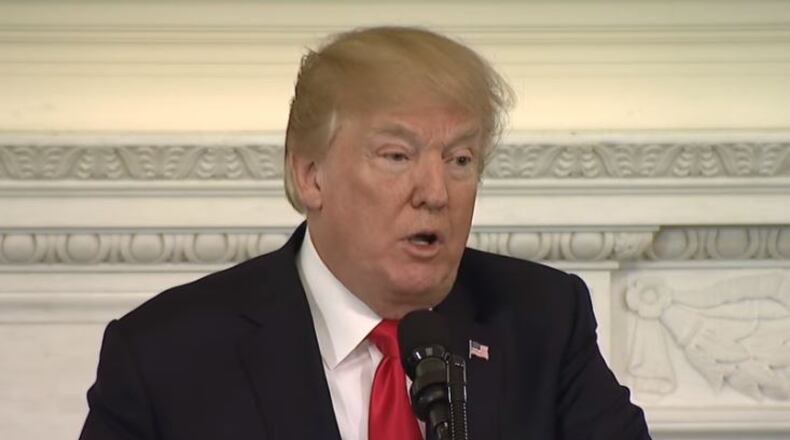A day after the White House announced that a special commission would study the idea of raising the minimum age to purchase a firearm from 18 to 21 years old as a way to stem mass shootings, President Donald Trump said Monday that he would first wait to see how the matter is dealt with in the courts, as the plan is already being challenged in the state of Florida by the National Rifle Association.
"On 18 to 21 Age Limits, watching court cases and rulings before acting. States are making this decision," the President tweeted, as he discussed his administration's plans in the wake of the mass shooting on February 14 at Marjory Stoneman Douglas High School in Parkland, Florida.
In the aftermath of that attack, Republican Governor Rick Scott of Florida on Friday signed into law a new plan to raise the minimum age for buying a firearm to 21 in that state - hours later, the NRA quickly filed a lawsuit against that, arguing the new law subverted the Second Amendment.
While a special panel led by Education Secretary Betsy DeVos will review the idea, the President made clear today that he's not rushing to embrace it, saying there was "not much political support."
Pressed repeatedly by reporters, the White House said Monday afternoon that Mr. Trump still supports raising the purchase age, but knows he cannot get that through the Congress at this time.
"I'm saying that the President is pushing forward on things that we know have broad based support, and can immediately get done," said White House Press Secretary Sarah Huckabee Sanders, as she repeatedly said Mr. Trump want to look at ways to best accomplish that goal.
Mr. Trump on Monday also renewed his support for the idea of banning the sale of 'bump stocks,' a mechanism which allows a semi-automatic weapon to be fired at a faster rate; it was used in the mass shooting at an outdoor country music concert in Las Vegas.
But like on the purchase age issue - there are already signs that type of move will be challenged in court as well.
As for the rest of the President's school safety plan, which was outlined on Sunday evening by the White House, Mr. Trump reinforced his support for allowing teachers and school personnel to carry concealed weapons, and said he was for changes in the background check system on gun buyers.
But unlike in a televised meeting with lawmakers after the school shooting Parkland, Florida, the President's plan did not mention his support for a broader bill from Senators Joe Manchin (D-WV) and Pat Toomey (R-PA), which would provide 'universal background checks.'
Democrats in Congress said there was one simple reason why the President had retreated on the purchase age issue, background checks and more - the influence of the National Rifle Association.
"The families and students suffering from the heartbreak of gun violence deserve real leadership, not a White House that cravenly tiptoes around the NRA," said House Democratic Leader Nancy Pelosi.
Democrats in those two tweets used Mr. Trump's own words against him, as in that February meeting with lawmakers, the President told Sen. Toomey and others that they had failed on background checks because they were "afraid of the NRA."
In terms of legislative action, Mr. Trump's school safety plan includes the "Fix NICS" bill, which would push states and federal agencies to funnel more information into the background check system, along with the "STOP School Violence Act," designed to help schools better identify warning signs about violence.
Both measures have bipartisan support - the school violence bill will be voted on this week in the House.
"I'm proud of this bipartisan bill - but this can't be the only step we take," said Rep. Ted Deutch (D-FL). "We need comprehensive gun reform now."
About the Author
The Latest
Featured



